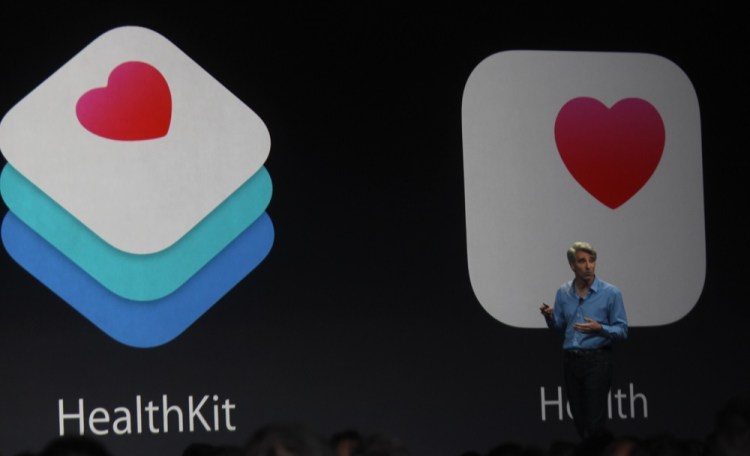Apple announced a new health app (called “Health”) today. And, far more interestingly, it also rolled out a new health data repository called “HealthKit.”
We may have just witnessed the birth of a new Apple ecosystem that follows a similar model to that of iTunes.
“They definitely planted some seeds today, while not releasing any hardware,” Reticle Research analyst Ross Rubin told me after WWDC Monday. “It’s similar to what they did with iTunes; iTunes came first, when there was a just a bunch of third-party devices (MP3 players) to access the music. The iPod hadn’t come along yet.” The first iPod came on October 23, 2001, about 8½ months after iTunes was released.
(Note: Rubin has recently started writing a column for VentureBeat.)
“They’re creating something like an open OS that will connect with a host of different wearables,” Rubin says. One wearable might collect your blood pressure, another might track your prescription drugs, while another might be a scanner that detects the nutritional content of the food you’re about to eat. The job of the HealthKit platform will be to collect and make sense of all that data — to provide a single, central place to keep all kinds of health data, Rubin said.
iTunes collects music data from a variety of sources and makes it easy for users to find the music they want to hear. Apple doesn’t own the music, the user does.
Similarly, Apple Health will provide a user-friendly portfolio of all of the user’s exercise, nutrition and body metrics (pulse rate, blood pressure, etc.).
An Apple spokesperson made a special point of telling me that the user owns and controls access to the data, not Apple.
iTunes, of course, is used for selling users more music and a bunch of other media. Will Apple’s Health app be used to sell things like customized workouts and health apps to users? You bet it will.
The Apple Health part of Apple’s many new features in iOS 8 will be a the front door to a marketplace. When you look at your health data in the Health app, you may see the health data that your wearable device generates, but you’ll also see a lot of spaces for other kinds of data that you’re not collecting. Your Nike app may be collecting your pedometer data, for instance, but it has no idea what your blood sugar level is. You’ll need another device and/or app for that — and Apple will make it easy to add.
The beauty (or curse) of iTunes is that it makes it super-easy to buy new music, movies, apps and whatever else with a single click. There are minimal barriers between impulse and purchase.
Apple Health will probably be the same way. The moment you realize you’re missing a specific type of health data, you just click the device you need and — voila! — you’re $79.95 poorer but maybe a little more health-aware.
This, of course, sets up a system where Apple must decide which devices and apps can appear in its health marketplace and integrate with its HealthKit repository. Nike wearables and shoes will be the first; Apple said today it is already working with the shoe company. (The Nike-Apple partnership go back a few years already, so that’s no surprise, and Nike recently fired a bunch of its wearables experts, the better to focus on software instead of its failing FuelBand product.)
Last week Samsung announced a similar platform for health data, although Samsung stressed the openness of its API a bit more than Apple did. With an open API, any wearables maker can make a device to connect with Samsung’s cloud platform (SAMI).
Apple will exert more control over who gets to play in its playground. If its approach to the iTunes App Store is any indication, it will likely bless a smaller group of health and fitness devices. Health apps will have to make it through a rigorous approval process in order to appear in the Health “store.”
But if there are enough of those apps, true openness may be moot: Consumers might find it simpler just to buy Apple HealthKit-compatible devices rather than worry about open APIs.
That’s just how it worked with iTunes music, after all.


